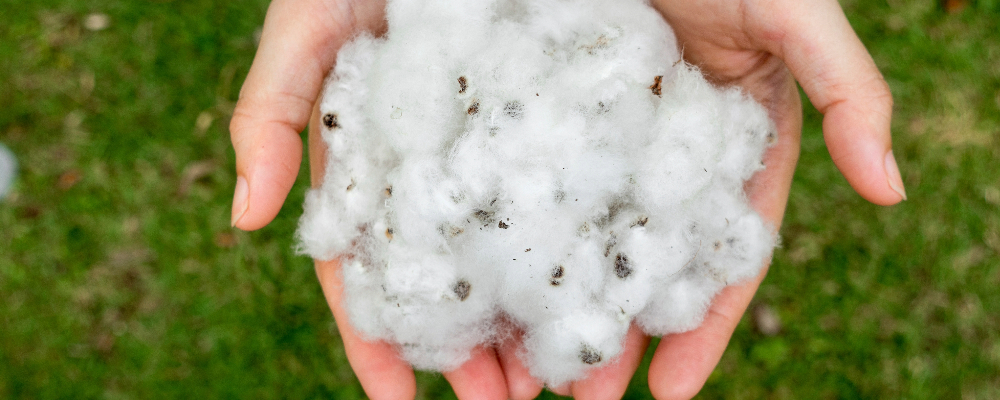In recent years, sustainability has become more than just a buzzword; it's a way of life. As consumers become increasingly conscious of the environmental and ethical impacts of their choices, the fashion industry has been forced to adapt. One significant change that has gained momentum is the shift toward organic cotton. In this blog post, we will delve into the fascinating world of organic cotton, exploring its benefits, production methods, and the positive impact it has on both the environment and the people involved in its cultivation.

Understanding Organic Cotton
Organic cotton is not your average cotton. It's grown without the use of synthetic pesticides, herbicides, or genetically modified organisms (GMOs). Instead, it relies on natural farming practices and alternative solutions to combat pests and enhance soil fertility. The absence of these chemicals makes organic cotton a more sustainable and eco-friendly choice compared to conventionally grown cotton.
The Benefits of Organic Cotton
Environmental Sustainability
One of the primary reasons behind the growing popularity of organic cotton is its environmental benefits. Traditional cotton farming is notorious for its heavy use of chemical pesticides and fertilizers, which can have devastating effects on local ecosystems, water quality, and biodiversity. In contrast, organic cotton farming promotes healthier soils and reduces the pollution of air and water resources.Additionally, organic cotton farming practices often involve crop rotation and the use of cover crops, which naturally replenish the soil's nutrients. This sustainable approach not only minimizes soil degradation but also promotes long-term agricultural resilience.
Reduced Water Usage
Cotton is a thirsty crop, and conventional cotton farming can place immense pressure on water resources, especially in regions facing water scarcity. Organic cotton, however, tends to use less water due to improved soil health and reduced irrigation requirements. Some organic cotton farms also implement rain-fed farming methods, further conserving water and reducing their environmental footprint.
Healthier Farmworkers
The absence of harmful chemicals in organic cotton farming benefits not only the environment but also the people who work in the fields. Conventional cotton farming often exposes farmworkers to toxic pesticides and herbicides, putting their health at risk. Organic cotton cultivation prioritises the well-being of farmers and labourers, providing safer working conditions and minimising their exposure to hazardous substances.
Enhanced Biodiversity
Organic cotton farms tend to support greater biodiversity than conventional cotton farms. By avoiding synthetic pesticides and promoting natural pest control methods, organic cotton farming provides a healthier habitat for beneficial insects, birds, and other wildlife. This approach helps maintain a balanced ecosystem, which is crucial for long-term sustainability.
The Organic Cotton Certification Process
To ensure the authenticity of organic cotton products, various certification bodies, such as GOTS (Global Organic Textile Standard) and OEKO-TEX Standard 100, have established rigorous standards for organic cotton production. To receive organic certification, cotton farms must adhere to specific criteria, including:
Non-GMO Seeds: Organic cotton must be grown from non-genetically modified cotton seeds.
Chemical-Free Soil and Pest Management: Organic farms use natural methods like crop rotation, companion planting, and biological pest control to maintain soil fertility and manage pests.
Restricted Chemical Use: Synthetic pesticides and herbicides are prohibited in organic cotton farming, and only approved organic chemicals are allowed in limited quantities.
Sustainable Water Management: Organic cotton farms aim to minimise water usage and pollution while maximising water efficiency.
Fair Labour Practices: Organic cotton certification often includes requirements for fair wages and safe working conditions for farmworkers.
The Fashion Industry's Adoption of Organic Cotton
The fashion industry plays a significant role in the demand for cotton, and its adoption of organic cotton is a significant step towards sustainability. Many clothing brands and designers are now incorporating organic cotton into their collections. This shift towards sustainable fashion aligns with consumers' growing awareness of the environmental and ethical implications of their clothing choices.
Organic cotton can be used to create a wide range of clothing items, from T-Shirts and jeans to dresses and activewear. Its versatility and eco-friendly properties make it an attractive choice for fashion brands seeking to reduce their ecological footprint.
Organic cotton represents a vital step towards a more sustainable and ethical fashion industry. By choosing organic cotton products, consumers can support environmentally friendly farming practices, protect the health and well-being of farmworkers, and contribute to the preservation of biodiversity. As the fashion industry continues to embrace organic cotton, we can look forward to a future where sustainable choices are the norm rather than the exception, creating a healthier planet for generations to come. So, the next time you shop for clothing, consider making the eco-conscious choice by opting for organic cotton garments.
Take a look at our Organic & Sustainable ranges here:
Organic & Sustainable T-Shirts
Organic & Sustainable Polos
Organic & Sustainable Hoodies